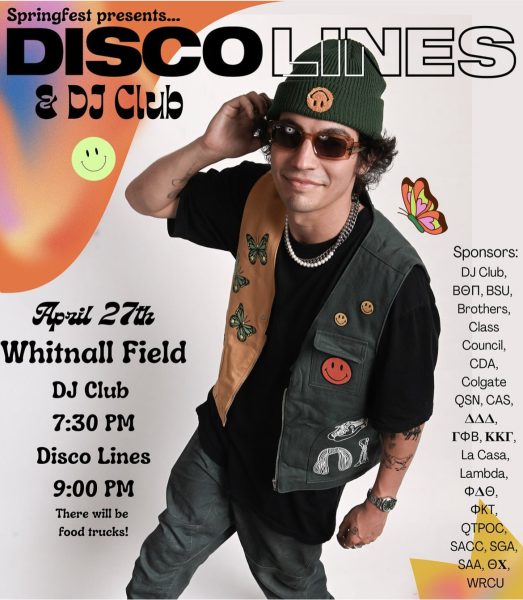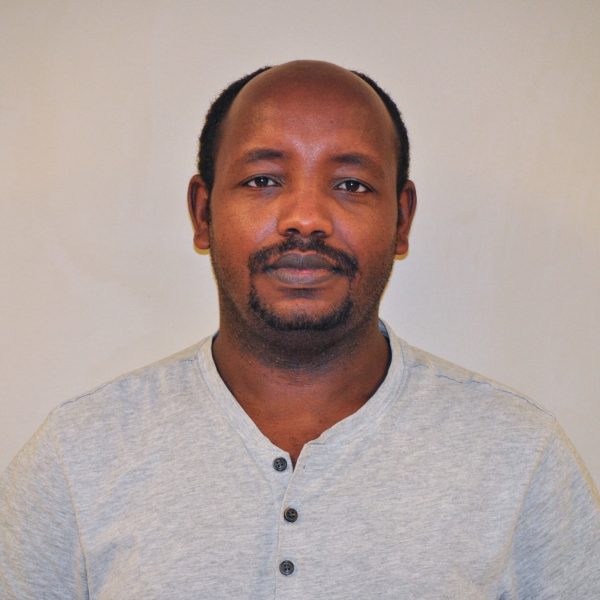Clinton Discusses Leadership in Front of 5000+
On Saturday, October 30, over 5,000 students, faculty and visitors piled into the Charles H. Sanford Field House to attend the Kerschner Family Global Lecture Series, featuring the 42nd President of the United States, Bill Clinton.
In recent years, the Kerschner Family Series has brought a diverse array of global leaders to Colgate, including the 14th Dalai Lama, Colin Powell and Tony Blair.
Despite the international stature of past speakers, former President Bill Clinton drew the largest crowd yet. Even though the wait-list for tickets to the event was lengthy, will call was handing out tickets two hours before the event. The doors opened at 5 p.m. for the 7 p.m. lecture, but many spectators did not arrive to find seats until 6 p.m.
Many spectators were anticipating a time-consuming security checkpoint and were surprised by the absence of metal detectors at the doors. Even the few who were able to attend a reception an hour before the lecture to take pictures with President Clinton were not subjected to any extra security measures.
“We become the faces for the parents at Colgate. We spend time with the Advancement Committee, create new ways to fundraise and provide support for the academics,” Co-Chairperson of the Steering Committee and mother of senior Sofia Adler, Alice Adler said. “I think having this Global Leaders Lecture is just extraordinary for the students, and that’s what our goal is, to give students the richest kinds of experiences that they can have at Colgate.”
Adler introduced President Herbst, who spoke about the accomplishments of the Clinton Global Initiative.
“To date, initiative members have made 1,700 commitments valued at 57 billion dollars, which has already affected more than 220 million people in 170 countries,” Herbst said through frequent rounds of applause for Clinton’s initiative.
Former President Clinton was asked to deliver an hour-long speech on the importance of leadership in creating a more peaceful world. He was also asked to speak about his time before and after his presidency. Clinton began his speech with a scientific metaphor relating the positively and negatively charged subatomic particles to the attitudes of the twentyfirst century.
“The world is full of all these crisscrossing networking possibilities, but it seems for every positive possibility, there is a negative one,” Clinton said.
He also spoke on the interdependence of nations and the importance of the development of a worldwide community.
“We can’t get away from each other and we can’t escape the consequences of our actions on others, around the corner or around the world,” Clinton said. “We have to try to build a world where we share the future, we share the responsibilities, we share the opportunities and we have a genuine sense of expanding community, which doesn’t mean that our differences don’t matter, it just means that our common humanity has to matter more.”
President Clinton also spoke about his global initiative of sustainability and its connection to issues around the world, including the Cholera epidemic in Haiti.
“Before the earthquake, three quarters of the people were living on less than two dollars a day. That’s by far the poorest country in our hemisphere,” Clinton said. “This is not a sustainable model if you believe that we live in an interdependent world where we have to have shared opportunities as well as shared responsibilities.”
When speaking on the crisis of climate change, Clinton urged people to consider the three main problems working against interdependence, including inequality, instability and unsustainable environmental practices. Clinton noted that solving these issues will provide more economic opportunities for all Americans.
“There is almost no discussion of the fundamental question of the twenty-first century, which is, whatever you propose to do and however much money you propose to spend on it, how do you propose to do it so that you turn your good intentions into positive changes,” Clinton said. “Colgate is an example of what we’re still the best at. We still have the best undergraduate education in the world,” the former president said in closing. Clinton’s lecture was followed by a short question and answer session.
Faculty and students were generally impressed with Clinton’s speech.
“President Clinton crystallized three major global issues in a way that is characteristic of his particular kind of brilliance,” Donald M. and Constance H. Rebar Professor of the Humanities Peter Balakian said. “He thinks about the largest issues; he’s able to comprehend them and convey his understanding and analysis of them in a clear, elegant manner that is hard to do. Only the best teachers can do it. He is surely one of the best teachers ever to be in the White House. He gave us a lot to think about and he did it in a thoughtful, reflective way that invited everyone into the conversation, no matter what their political leanings,” Balakian said.
Senior Michael Newberg was awed by Clinton’s intellect.
“I was most surprised by how knowledgeable Clinton was across so many disciplines. Whether he was talking about science, international relations, medicine or philanthropy, Clinton seemed to be an expert on everything he discussed,” Newberg said.
Many students also commented on the former President’s physical appearance.
“Although he was definitely looking a lot older, his speech had some very important and progressive points about clean energy, education and other factors that are vital for the future,” senior James Gerken said.
Junior Elizabeth Stein also noted that Clinton had aged.
“I have to admit, I did find myself zoning out and contemplating how much older he seems in person than in publicity photos,” Stein said.
While Stein believes that Clinton is one of the greatest and most articulate Presidential speakers America has ever seen, she was not impressed by the content of Clinton’s speech. “I thought his remarks were entirely too political for a lecture series that I assumed was meant for the purpose of instructing Colgate students on how to be good global leaders, though I suppose it can hardly be unexpected with the Election 2010 only four days following,” Stein said.
ABC reporter, Colgate alumnus ’83, and parent of current student and sophomore Mack Woodruff, Bob Woodruff believed that the most significant aspect of Clinton’s lecture was his advice for students entering the real world after graduation.
“Given the fact that my son, too, was there watching Bill Clinton speak, I think one of the most important things he said was that, given the way the economy is, it’s a chance to do something unique. The example he gave was joining the Peace Corps. Do it while the economy is recovering. Try something new and turn a different direction later on. I think that was a good message for the students,” Woodruff said.
Woodruff also noticed that President Clinton never looked down at the podium to read his speech from note cards.
“He’s got his entire speech perfectly memorized, so fluent. He doesn’t need any prompters. He can just go to a speech and talk,” Woodruff said. “It is always more interesting to listen to a president speak after he is done being a president. The speeches are always more interesting once they have served for eight years as president.”
Mark Weisbarth, parent of recent graduate Adam Weisbarth ’10 and current student, sophomore Sam Weisbarth, echos Woodruff’s sentiment.
“To me, what was really great was being able to see these politicians outside of their native habitat. When they are in situ, they are so predictable, so on message, but when you get these politicians outside of their habitat, you realize how amazing they are,” Weisbarth said.
Alice Adler found Clinton to be charismatic as well.
“When we went up to him to have our pictures taken, Clinton began talking about what kinds of saxophones he had at home. He was really very engaging with all of the people who had photo opportunities,” Adler said.
Associate Vice President of Advancement Mari Assaid has been receiving positive feedback about the Kerschner Family Series.
“From all of the parents and the students I’ve talked to since the event, everyone was so excited that Colgate was able to have a former President and were impressed by how amazing he was in person. He was able to relate a simple message of being passionate about what you do in life and never giving up on trying to find that passion,” Assaid said.







